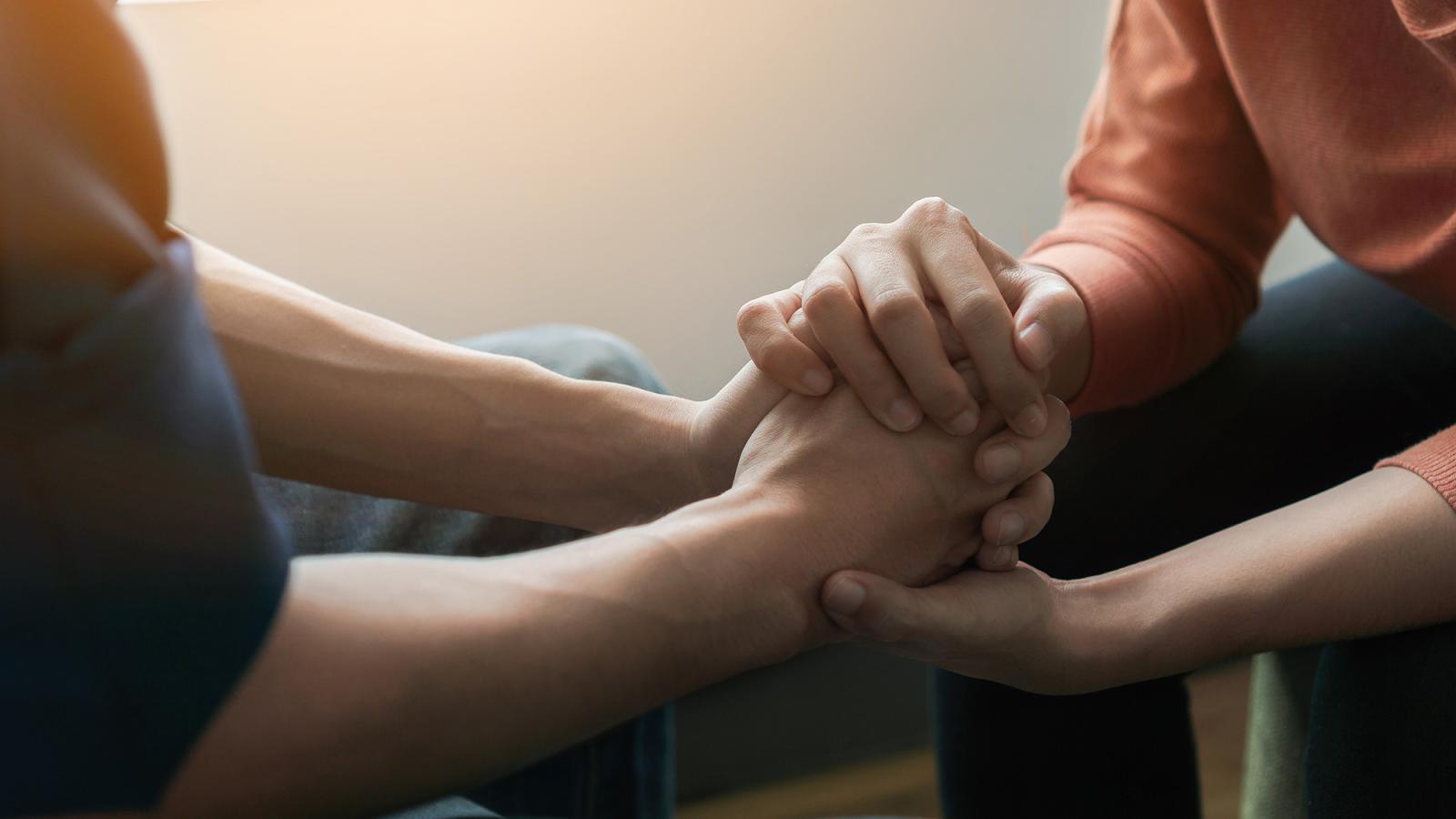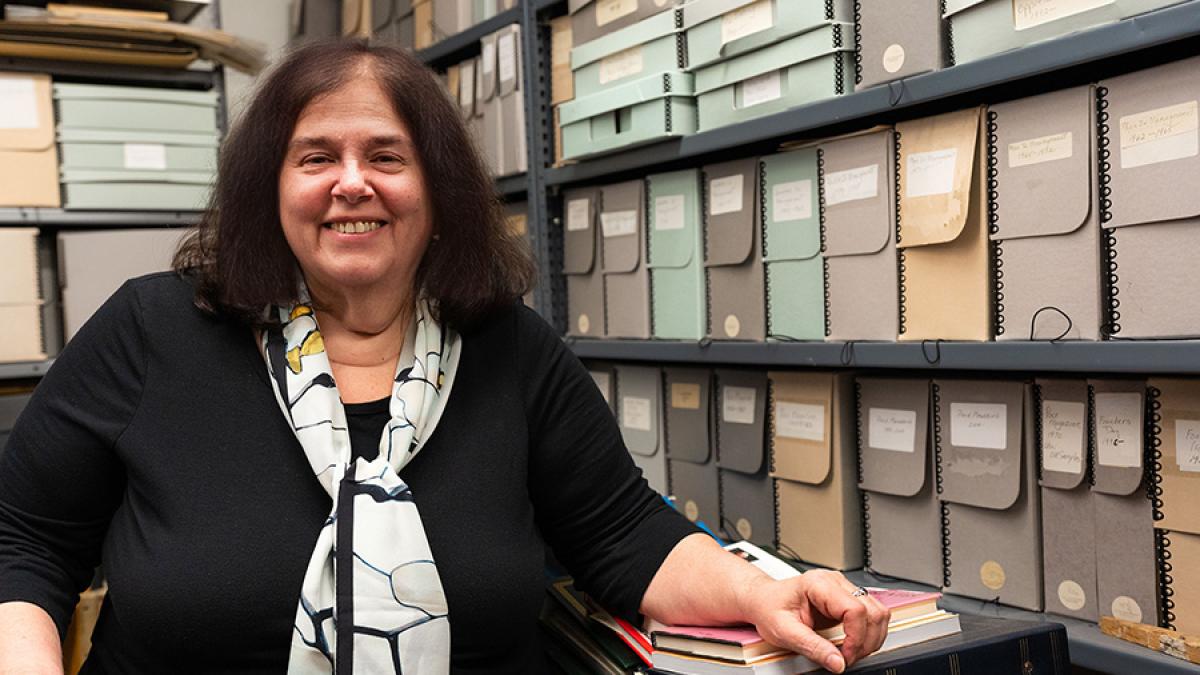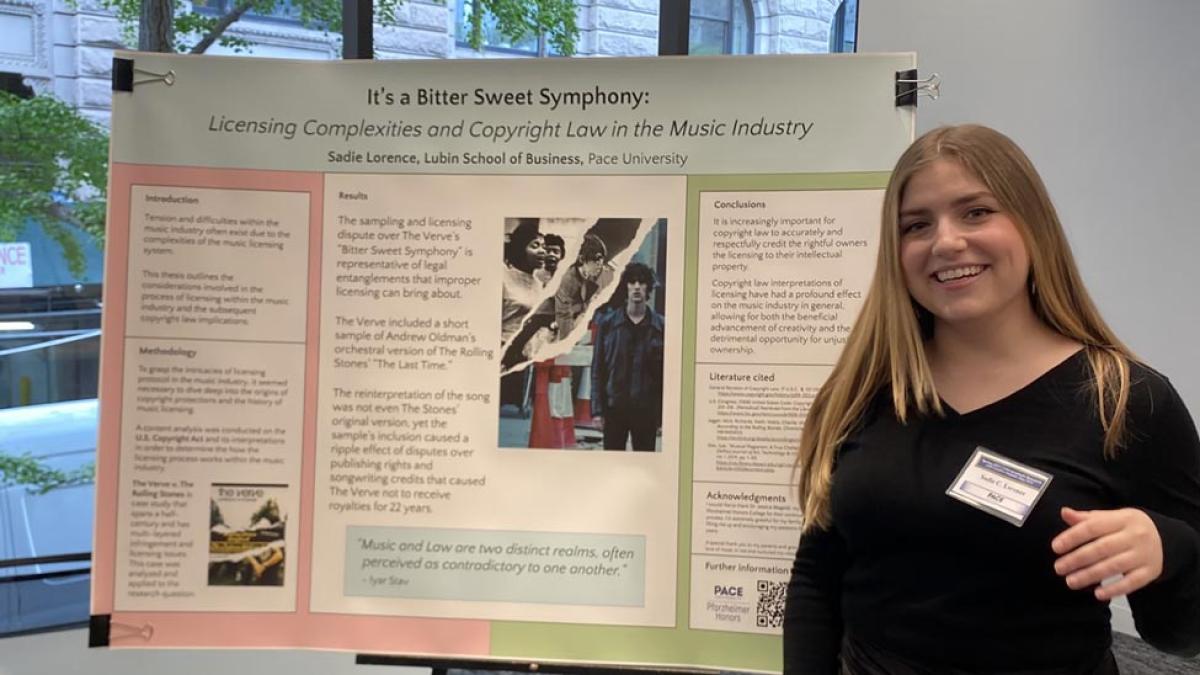With the impending opening of our new modern, sustainable, and welcoming campus building at 15 Beekman and the soon-to-start renovations of One Pace Plaza East, Pace has big plans for downtown. Simply put: Pace is building.
From Awareness to Action: Perspectives on Mental Health in Colleges

Gen-Z has led the charge towards heightened awareness and advocacy for mental health. Despite this activation, college students are actually reporting even increased mental health concerns, with “almost three quarters of students reported moderate or severe psychological distress” in 2021, according to the National College Health Assessment (PDF).
There are many factors that could contribute to this increase, from the shared trauma of a global pandemic to anxiety over climate change and societal instability, to increased reporting because of mental health awareness. As multi-faceted as the reasons may be, so must be the response.
The Student Perspective: Seeking Belonging
Stephanie Spruck ’25 has a unique perspective on student mental health. She’s pursuing a bachelor’s in applied psychology and human relations, but her passion for mental health was ignited through the RADical Health program at Pace.
The program, founded and facilitated by the RADical Hope Foundation, is a four-week, peer-led discussion group that discusses and builds on concepts like emotional intelligence, resiliency, self-awareness, stress management, and more. “One of the main goals of the group is to foster self-awareness and growth, both personally and interpersonally with others. Building connection and meaningful relationships starts with the relationship with yourself,” Spruck explains. “We identify the building blocks of who we are - our values, interests, strengths, and goals - and create a plan for how we can deal with the stresses of life. From there, we learn how to foster meaningful relationships with others."
Spruck’s first year at Pace was online due to the pandemic and it was because of her desire to connect with fellow students that she signed up for RADical Health. The experience spoke deeply to her so when the opportunity to volunteer for RADical Health was presented to her by Sue Maxam, EdD, who had led her group, she jumped at it.
For college students there is this intense pressure to know what you want to do and have life all figured out, and I think there’s a lot of identity crisis.
She served first as a co-guide and is now a full-fledged guide, leading groups of students through the program that so inspired her. And it’s given her a unique perspective into the particulars of mental health among college students.
“I learned that the main thing that us students really need, especially coming from quarantine and even still really feeling the residual effects of the pandemic, is connection,” Spruck reveals. While of course she’s facilitated conversations surrounding anxiety and depression, there’s a common theme throughout her groups that seems to reoccur—loneliness.
She believes this is because for many college students, this time period is often when they begin to first tackle the existential questions of self, values, and purpose, and that their usual support systems might not be in the same place they were. That’s where RADical Health comes in.
“For college students there is this intense pressure to know what you want to do and have life all figured out, and I think there’s a lot of identity crisis,” Spruck says. “There’s that sense of ‘who are we? Are we what really what our parents taught us all of our lives? Are we what our friends say we are?’”
Spruck found that RADical Health helped her realize she was not the only person feeling this way, and each program reveals more and more that connecting with students going through the same issues is a huge step in accepting these struggles. “RADical Health taught that I don't need to have life all figured out. I don't need to have this blueprint of where I'm going to go in life. I just need to figure out first who I am,” says Spruck. Instead, the holistic approach focuses on care-plans, understanding values, physical and mental health practices, and mindful connection building. “I just need to take the first step to figure out first who I am—my interests, passions, and values—and that will be my compass on the journey.”
You don't really need to do grand gestures, just asking someone how they are and checking in on your student really goes far.
The concept of their students changing can be an alarming concept for parents and families who are already dealing with their own pain of letting their child out of the nest into their own world, but Spruck has advice for them as well. “I think that sometimes family might not see how we are changing, or realize that our interests and dreams might change. No matter what, we're still who we are inside, and we want nothing more than to be understood, seen, heard, and loved.”
Further, she adds, “And I think that they [parents and families] should know that really asking someone if they are okay or do they want support or do they need anything goes a long way. You don't really need to do grand gestures, just asking someone how they are and checking in on your student really goes far.”
The Parent Perspective: Finding the Words
Jolina Halloran ‘89, ‘93 has been spreading this very message to parents for the last few years.
Halloran and her husband ‘90 have strong roots at Pace, where they met as undergraduates After receiving her MBA in International Business and working 13 years in the corporate world, she left to be a stay-at-home mom, but eventually returned to Pace and is now the Assistant Director of Academic Advising.
But her experience with student mental health is not from her professional experience. It’s personal.
On January 23, 2018, she and a coworker found themselves in a discussion about life, jobs, and children. They remarked that the loss of a child seemed like an event that could not be survived. She left the conversation and thought to text her son Brian, but she knew he’d likely be in class, where he was in his second semester at the University of South Carolina. The moment passed, and her day went on.
If you see someone struggling, ask them straight out.
Seven hours later there was a knock on the door. Halloran and her husband Brian received the worst news parents could receive. Their son had lost his life to suicide.
Halloran recounts the story as especially traumatic. The officer who reached out to them had no information, not even the name of her son. With two sons in college, this meant they had to ask the right questions to get a full understanding. Now, it’s common practice to send a social worker to help families, but the Hallorans were left in the wake of this horrible news to fend for themselves.
To say that day changed their lives forever would be an understatement.
But now the Hallorans are changing their lives and the lives of others for the better.
“That same year, in July of 2018, New York State mandated that all New York State schools had to have some type of mental health education, somehow,” Halloran explains. “But they never provided any resources, meaning they didn't provide any extra funding, any clinicians, and they didn't provide any curriculum.” So, some schools could add a one-hour unit into their health classes and have fulfilled their requirement, without actually bringing anything of lasting value to the students.
“We did not feel like that was enough,” Halloran says.
She and her husband founded the Break The Hold Foundation, in honor of their son. Break The Hold is a play on words, a football-inspired homage for their son, who loved football. And the acronym is also his initials—Brian Thomas Halloran.
The Hallorans formed the BTH Foundation under the Mental Health Association of Westchester. Within six months, the nonprofit had already organized its first Into the Light walk—which has now been an annual tradition for five years—and they were able to raise around $50,000 to pay for a mental health clinician in their school district. In addition to fundraising, the BTH Foundation has been awarded two grants from Westchester County, totaling $170,000.
He didn’t have the verbiage to express how he was feeling.
One of BTH’s main goals is to set up school districts with trained mental health clinicians who provide Dialectical Behavioral Therapy (DBT) STEPS-A training to students. DBT STEPS-A is a unique social emotional learning curriculum that offers a universal approach for teaching emotional regulation skills and coping strategies specifically designed for middle and high school students. It has four main modules: mindfulness, distress tolerance, emotion regulation, and interpersonal effectiveness. All clinicians hired by the BTH Foundation are trained in DBT STEPS-A at the CBC in White Plains, NY before they are assigned to a school.
To date, they’ve established clinicians in three middle and two high schools in the Westchester area. “We pay for the first year to deliver the program, to roll it out, and then usually after that the schools are able to build it into the budget so that they can continue it.” Though, when they can’t, the BTH Foundation continues to fund the clinicians’ salary so that school has access to mental health care.
Halloran also organizes programming for parenting classes that the foundation offers, so that work that their clinicians are doing in schools carry over in the home. In her own experience, students often struggle to put their feelings into words, which can make it difficult for parents to spot the warning signs. “After Brian passed, a lot of his friends came to us and they said he was already talking about ‘feeling funny,’” Halloran says. “He didn’t have the verbiage to express how he was feeling.”
Say the words, be honest, and then tell students where to get help.
A way to give students that verbiage is by allowing them more opportunities to practice speaking for themselves. “One of the things that I learned, and I wish that I did more for my children when they were growing up, is not to solve all their problems,” she says. “I feel like these days as parents, we jump in so quick.” She’s learned in the program to listen without judgement, ask them to describe their feelings, and guide them to find their own solutions. It builds trust, confidence, and emotional resilience, while safely allowing students to practice putting their feelings into words, solving conflict, and managing stress.
The other advice she has for parents, or for anyone who is worried about someone, is to not be coy about offering help. “If you see someone struggling, ask them straight out,” she says. “Do not be afraid. Ask ‘Do you feel suicidal or like taking your own life? Do you feel like hurting yourself?’” There is a common misconception that asking someone if they are suicidal may plant the idea in their head or increase risk, but it’s actually the opposite. Openness about suicide reduces risk.
Halloran’s suggestion for colleges trying to improve the mental health of their students is much along the same line. “One thing I feel that colleges need to change, they just need to be more open. Say the words, be honest, and then tell students where to get help,” she says. “I feel like we tiptoe around the topic, and I hope that changes.”
The University Perspective: Mental Health and Pace
Harriet R. Feldman, PhD, RN, FAAN, understands wellness. She is a nurse herself and has been at Pace for 30 years, seventeen as Dean of the Lienhard School of Nursing and College of Health Professions, and for the past two years she’s served as Pace’s inaugural Chief Wellness Officer.
The position was one of the recommendations from an internal study on mental health at Pace, though the position itself is focused on wellness in all its forms: emotional, physical, spiritual, intellectual, occupational, financial, social, and environmental. Since she’s taken on the role, Pace has created a wellness website and a Wellness Strategic Plan, hosted a Wellbeing fair, and introduced new programming across all campuses.
It’s a far cry from where it all began. “We had nothing essentially,” Feldman says. “In the first six months of the position I did what I called a listening tour.” She spoke with students, faculty, and staff, one-on-one, in small and large groups, with the hopes of uncovering two things: what did they see as the main issues, and what was Pace already doing to support wellness. “I was surprised to hear how much was actually going on,” she says. “But unfortunately, a lot consists of separate small initiatives; nothing really that pulls everything together or provides support it in a specific way. So, when we worked on a strategic plan, we tried to address the gaps by looking at how we can help faculty, students, and staff to attain or maintain wellness.”
We want to promote belonging as a sense of belonging is key to mental health and student retention.
She and her team have worked to expand programming aimed at improved mental health. Programming has included book discussions, rock painting, kindness boards, and more. “We’ve worked closely with the Kindness Foundation that Lady Gaga and her mother founded. We’ve taken a number of their programs and students really to seem to resonate with it.” The Wellbeing Fair brought together resources from within Pace and the surrounding communities in Westchester and NYC, with nearly 650 people attending and 100 tables of resources and opportunities across the 3 campuses.
Despite the massive increase in programming and great support from our Psychological Counseling centers, Feldman believes there’s still a need for more. “A lot of this programming needs to be expanded. I think we need to pull many more students in, involving them in developing the kinds of programs they want and participating in the various wellness committees we have. We want to promote belonging as a sense of belonging is key to mental health and student retention.”
The other recommendations are mostly logistical. One challenge is understanding which programs and initiatives are the most effective, which requires the infrastructure to gather and understand metrics. “Besides program surveys, we really don't have data to measure improvement. . And that is something that some of the universities do; they are able to show health improvement through actual metrics on different health measures,” Feldman says. “I would love to see us build to that level. It's going take a number of years to do so, but from what I can see the University has a strong commitment to seeing this happen.”
We want to help people be in touch with who they are and how they handle issues.
And of course, with programming comes costs. “I would love to see donors to help fund this initiative. I think that would be extremely helpful, whether it's a board member, alumni, or others. It would be really terrific if we could get an endowment, or something specifically designated for wellness initiatives.”
Feldman’s observations on student’s mental health reflect the observations of RADical Health peer leader Stephanie Spruck—students want to feel connected. “I think the whole sense of belonging ties into mental health. The self-sense of belonging, the confidence that people have in themself and their abilities are certainly a piece of it. We want to help people be in touch with who they are and how they handle issues.”
These mental health programs and initiatives not only bring necessary resources, but also remind students that they aren’t alone, and connect them with people who may understand.
The Right To Mental Wellness
Mental health is a nebulous term, one thrown around often as a hot button issue without real clarity on either the main issues nor solutions. Despite the uncertainty, there is one resounding truth.
Mental health care should be a right for everyone. And while we may not be able to do everything help, we should be willing to do anything.
“What I found out with my son,” Halloran says, “is that people who struggle with suicidal thoughts are the strongest people. They fight every day to get up, to be normal or seem normal, and to get through the day.”
Spruck has a simpler message for students: “Your mental health matters and you deserve to be taken care of.”
Take action with the Break the Hold Foundation.
Learn more about RADical Health by emailing smaxam@pace.edu or check out Pace’s Wellness website for wellness resources for students, staff, and faculty.
If you or someone you love is struggling with suicidal ideation, please utilize the 988 Suicide and Crisis Lifeline.
More from Pace Magazine
For 42 years, Ellen Sowchek has been sharing her infectious enthusiasm for Pace University history. Take a look at five of her favorite finds from the University archives.
Lubin student Sadie Lorence spent her senior year researching the intricacies of a notable legal dispute around the ’90s hit song, “Bittersweet Symphony”–and in doing so, has found her professional calling.


